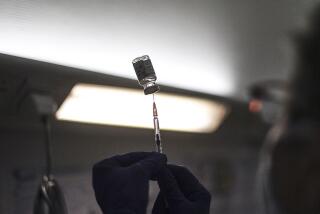Genentech Cancer Drug Fails Initial Treatment Test
- Share via
Genentech Inc. suffered a rare setback Wednesday when the biotech giant said its experimental cancer drug Tarceva failed to improve survival in lung cancer patients when given as a first treatment along with chemotherapy.
Although the results disappointed Genentech’s scientists and its partners, Roche Holding and OSI Pharmaceuticals Inc., Wall Street had not expected the drug to work as a first-line treatment for lung cancer. As a result, Genentech’s shares fell less than 1% and closed at $79.72, down 42 cents, on the New York Stock Exchange.
Tarceva is still being tested as a secondary lung cancer medication and analysts expect the drug will work for that group of patients, although sales are expected to be modest. South San Francisco-based Genentech said those clinical trial results are expected early next year.
Tarceva belongs to a new class of cancer drugs that try to knock out tumors by disrupting the molecular switches involved in tumor growth. The switches, called epidermal growth factor receptors, or EGF receptors, are found on two-thirds of solid tumors.
Other drugs in this class are Erbitux, an investigational medicine from ImClone Systems Inc., whose former chief executive, Samuel D. Waksal, went to prison this year as a result of a federal insider-trading probe. Thousand Oaks-based Amgen Inc., the world’s largest biotechnology company, also is developing a similar drug with Abgenix Inc., a biotechnology company based in Fremont, Calif.
But the Tarceva trial results have little meaning for rival drugs racing it to market, analysts said Wednesday. Tarceva is a pill that goes to work inside the tumor cell, while ImClone’s Erbitux and the investigational Amgen drug are synthetic antibodies that sit on the cell surface. Moreover, the antibody drugs are being tested in colon cancer patients.
“It is clear that not all EGF drugs are created equal, but what that means, we don’t yet know,” said David Bouchey of C.E. Unterberg Towbin.
In May the U.S. Food and Drug Administration approved AstraZeneca’s drug Iressa as the first EGF cancer drug. The once-daily pill is given as a secondary treatment for lung cancer patients who failed to improve on other drugs. Like Tarceva, Iressa also had failed in tests as a first-line treatment for lung cancer.
If Genentech’s Tarceva is approved by the FDA, it would compete with Iressa. Mark Schoenebaum of US Bancorp Piper Jaffray forecast that Tarceva sales would hit $57 million in 2004 and $133 million in 2005.
Last year 154,900 people died in the U.S. from lung cancer, according to the American Cancer Society.
Genentech also is studying Tarceva as a possible treatment for other cancers, including pancreatic cancer and brain cancer.
Despite the uncertainty over Tarceva, Genentech’s stock has climbed 140% so far this year, primarily on the strength of its promising experimental cancer drug Avastin.
In May Genentech announced that Avastin, when used with chemotherapy, added five months to the lives of colon cancer patients in a large clinical trial. If the FDA approves the drug, analysts say Avastin’s annual sales could exceed $1 billion.
More to Read
Inside the business of entertainment
The Wide Shot brings you news, analysis and insights on everything from streaming wars to production — and what it all means for the future.
You may occasionally receive promotional content from the Los Angeles Times.










